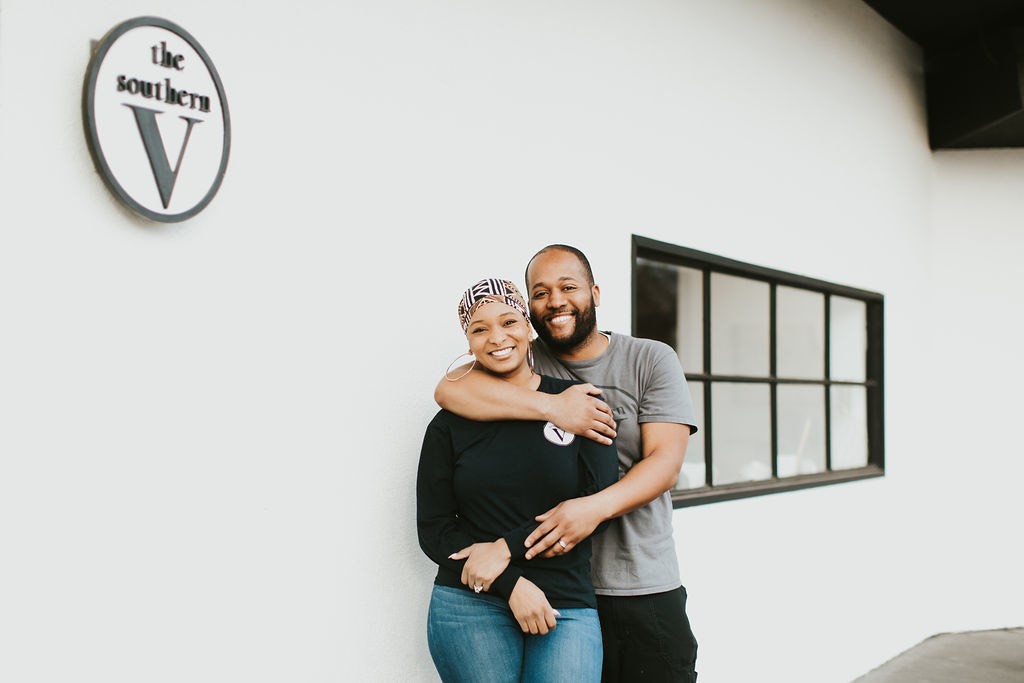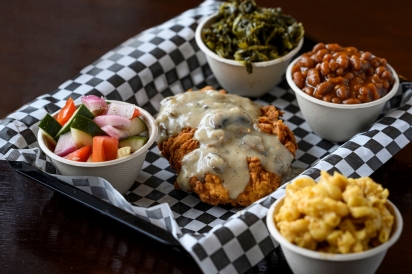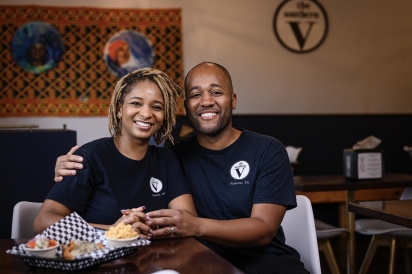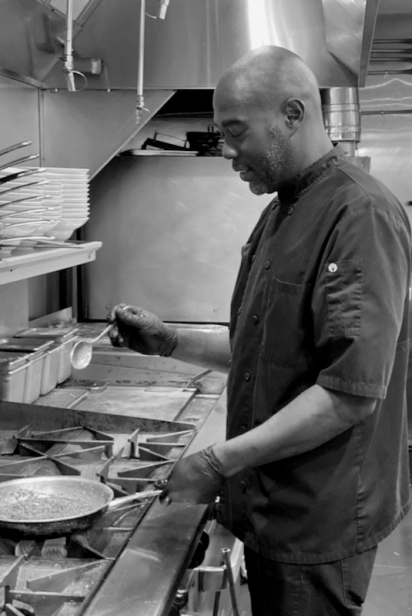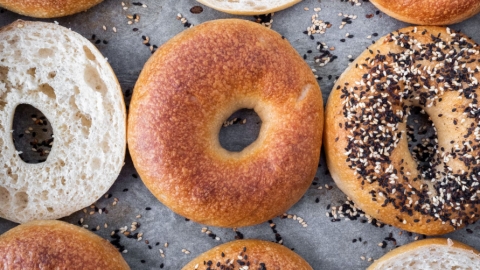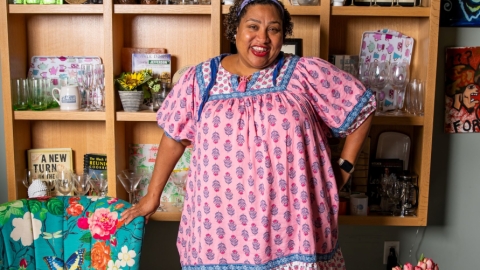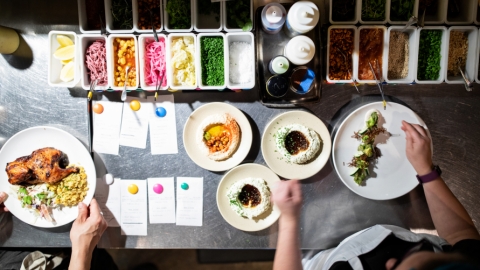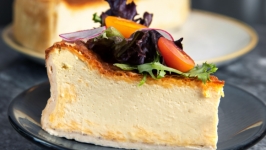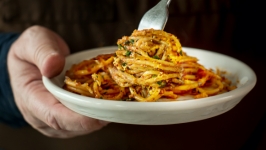3 Black Chefs Share Their Journeys: Southern V, Swett's and Answer
pro·cras·ti·nate
- delay or postpone action; put off doing something.
New Goal: Stop procrastinating
By waiting until the last minute, I’ve had a wonderfully intense week of interviewing 3 passionate chefs, trying their food, and hearing their stories. It is the collection of their stories I now share with you.
But first, I’m just eating the last couple of bites of my research for this article (even though I haven’t finished taking off the weight gained working on my previous article on Nashville’s Bagels). Here’s what I just ate some (or all) of:
¼ Hot Chik’n Salad
⅓ Chickpea Tuna Salad
½ 1 Cliff Burger (aptly named and created by Clifton Hancock)
¼ 7/8 BBQ Jackfruit Sammich
½ each side of turnip greens and green beans
All of which was from The Southern V, a highly original vegan Southern comfort food eatery, where you can also get some great fresh fruit smoothies.
Tiffany and Clifton Hancock, The Southern V
Tiffany and Clifton Hancock were gracious enough to spend an hour with me yesterday on zoom, and Tiffany held their 4-month-old on her lap the entire time. Makes sense, since what they do is all about family. In fact, they began the transition towards a vegan lifestyle after the birth of their 2nd daughter, Norah, when they realized that she was showing intolerance to certain foods that Tiffany was consuming. Shortly after giving up meat, dairy and soy, Tiffany developed a craving for Krispy Kreme doughnuts. Knowing she couldn’t eat one, she developed a vegan doughnut that she and Clifton started selling at farmers markets. But doughnuts alone didn’t satisfy two native Tennesseans’ cravings for the southern food of their childhood. With no options available, Tiffany started to create vegan dishes that resembled her household standards like fried chicken, macaroni and cheese, meatloaf, and other classics. The Hancocks noticed that vegan Southern comfort food was an open lane in a region where many southerners might start to transition to a meatless diet if they could choose food they could relate to.
In seven years, they’ve gone from a place where people could not fathom there being a Southern vegan restaurant in Nashville to becoming a destination for vegan tourism. They lead by example and they teach from experience of having grown up Black in the south. Tiffany says, “race relations were prevalent as a kid. I was pushed to give ten times more effort than the next person…to be noticed…to show that I was worthy.” Clifton describes so well how “being in a marginalized group with preconceived notions always precede you…some may not view you as an individual first.” The Hancocks understand that they cannot control the world in which they exist; however, they can cultivate confidence, knowledge of self, and knowledge of culture within their children by being receptive to the journeys of others. Their motto is “Be the change you want to see.” Wow.
Chef Marcus Rhodes, Answer
“Culinary saved my life,” Chef Marcus Rhodes shared with me during a great conversation the other night. He also shared that he has a photograph of 13 of his high school friends at a football game. Only two haven’t been murdered. He’s from the Orange Mound neighborhood in Memphis, he describes as “one of the first neighborhoods built by Black people for Black people. It was a tough neighborhood and there were no positive role models.”
Admitting he was somewhat of a rascal in his younger days, he spent a lot of time grounded and the only place he could hang outside of his room would be in the kitchen with his mom. Maybe that’s why cooking was such a natural direction for him to discover. He came from a cooking family. And every holiday it was his house the family wanted to gather at. Once a week, his mom and step-dad would cook special dinners for their date nights, and Marcus remembers breaking off part of a crab leg (thinking they wouldn’t notice) that he would chop up and add to the ramen noodles he and his siblings were left to have for themselves. He credits being poor (and staying in trouble) with fueling his creativity.
After dropping out in 11th grade, Marcus’ mom helped him choose Turner Job Corps in Albany Georgia. It both got him out of his neighborhood and, at age 16, exposed him to the first time he saw a Black female chef -- his teacher, Minnie Rivers. But before he could get behind a stove, he had to master the math and sciences needed to understand how to cook. Having personally been through it, Marcus wants to find a way to reach other kids. “Nobody helped me,” he said. He cares deeply about “showing young Black men there’s another route.” His vision is to create a non-profit affordable culinary school to offer the possibility to young Black students that they can become chefs in what was, until very recently, a heavily white male dominated profession. Affordability is key, as Marcus usually advises young cooks working under his tutelage not to go to Culinary School. Instead of building up massive debt, they should work under as many great chefs as they can. (He also shared some more stories about his kitchen experiences under other chefs, but I probably shouldn’t print those.)
I couldn’t end the conversation without mentioning how much I liked his fried green tomatoes with crabmeat. “Lobster,” he corrected me, “with goat cheese-based pimento cheese. I always try to take ingredients I grew up eating and turn them into a fine dining experience based on memory and creativity.” I’m sure you’ve guessed that I would tell Marcus I’d be there that evening to pick up an order of the fried green tomatoes to-go.
David Swett Jr., Swetts
Anyone who knows David Swett Jr. appreciates his direct honesty, his humor, his love for his children, and his passion for cooking. David cuts to the chase.
“Black chefs are undervalued. American food is mostly Black. But white people act like Meat ’n 3’s were their idea. I don’t want any special treatment, just give us the f*king credit…. You have to constantly remind yourself you are somebody. There was no rolodex full of contacts my father could call when he needed a loan to build the new restaurant.”
David finds himself living a split duality and feels it’s time to provide “more opportunities for people to shine.” And he’s doing just that with his relatively new company, Onyx Foods. He has an all-Black staff, including four highly trained chefs. Like Marcus Rhodes, David talked about providing role models that they didn’t have growing up. When young people get to volunteer cooking in his kitchen, they get to see people like them doing a job that Marcus didn’t even know existed at their age.
I start to cry as I read through more of David’s quotes that I jotted down during our 2 ½ hour conversation. So, I think I’ll stop here and just say thank you to David for providing us with “comfort food made with love and care” and for being so passionate and giving.
Epilogue
For those of you who have started getting to know me, I’m sure you’ve guessed that my solution for anything begins with food. Food is a way to begin to understand the many diverse cultures we’re lucky to have here in Nashville and food is the path forward.


